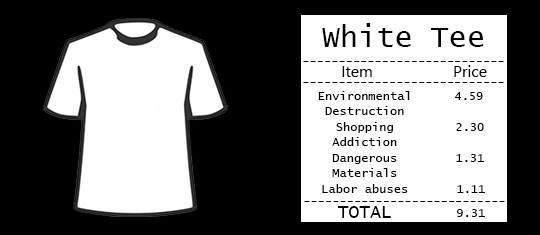In the eyes of many young people, fast fashion can be amazing. They are able to buy fashionable clothing for cheap and have it delivered to their doorstep. Despite these upsides for consumers, there are many underlying issues with fast fashion. Environmental impact and landfills being flooded with wasted clothes, thrift stores being overwhelmed with poor-quality clothes, and the mistreatment of textile workers. Another factor to consider when deciding whether to buy from fast fashion brands is ethical consumption, and whether or not companies reject it. Many companies instead encourage mass buying of cheaply made products that are made to be thrown away quickly rather than last for a long time.
Earth.org defines fast fashion as the mass production of cheaply made clothes to adapt to changing trends. This mass production of clothing primarily takes place in China (where all Shein’s clothing is made), often by underpaid employees working in harsh conditions. This is the backdrop for fast fashion online retailers and their billion-dollar mass production of poor-quality clothes.
“Workers for some suppliers of the Chinese fashion giant Shein are doing excessive overtime,” reports the British Broadcasting Center.
China is known as the “world’s factory” due to its massive manufacturing industry. A large part of the reason their manufacturing industry is so big is because of their very relaxed labor laws. Until being outlawed in 2021, many Chinese companies used a ‘996’ working schedule; employees work from 9am-9pm, 6 days a week. Shein has used similar schedules in the past with their employees, and have had multiple controversies relating to labor rights, most recently in 2021 when a Swiss advocacy group called Public Eye found out that some employees in Shein’s factories were working up to 75 hours a week.
Environmental impact
The fast fashion industry has an extremely negative impact on the environment. In recent years, landfills have been filled to the brim with discarded, low-quality clothes made with non-biodegradable materials.
“Because these retailers rely solely on international shipping to move their products, they only exacerbate the annual billion tons of greenhouse gases released by shipping,” according to the New York Times.
Online fast fashion companies like Shein, as well as many others, are responsible for massive amounts of greenhouse gases being released into the atmosphere. An excess of these gases in the atmosphere causes more deterioration of the ozone layer. These companies do this through the enormous number of orders they ship out daily which require huge amounts of fuel and gas that pollute the atmosphere.
Worker exploitation
Many of these fast fashion companies pay their employees far below minimum wage, while working long strenuous hours with few or no breaks. There is also little time after work to fulfill their basic sanitary needs.
“At one of the factories, workers get a base salary of 4,000 yuan per month — the equivalent of roughly $556 — to make at least 500 pieces of clothing per day, but their first month’s pay is withheld from them, per the investigation. Many of these workers toil long hours to earn a commission of 0.14 yuan, or just two cents, per item,” according to the Alliance for American Manufacturing.
This is another example of Shein’s unethical working environment and the common exploitation of workers in fast-fashion companies. The way many fast fashion companies treat their employees is horrible and needs to be changed to better benefit those who work hard to help these companies make money.
East High School junior Camryn Whitney originally thought that Shein was just a normal online website where people could buy cute and cheap clothes with quick and reliable shipping, to them the website used to be nothing more. But when Whitney found out about Shein’s unsavory work environment they were upset that they even considered buying from Shein and supporting this type of company.
“It’s upsetting because they can’t do whatever they need to fulfill sanitary needs,” Whitney said.
Guide to ethical consumption: Ethical consumption is the idea that your consumption should cause as little harm to the environment as possible. For example, researching how the product you are purchasing was made and how the company’s working conditions affect their employees.
So, with all this talk about “unethical consumption,” how does someone practice ethical consumption? Ethical consumption can be difficult to practice when society prioritizes and encourages over consumption of easily disposable products. But there are many ways to be a more thoughtful consumer; these things can be as simple as looking into the practices of companies you purchase from or buying more secondhand clothes from thrift stores or small businesses. If you buy online, try places like Etsy or Depop which are made up primarily of smaller businesses. Instead of tossing all old clothes with wear and tear, try learning how to upcycle your clothes, repairing, and making something new from old and worn clothes can be fun and better for the Earth.




